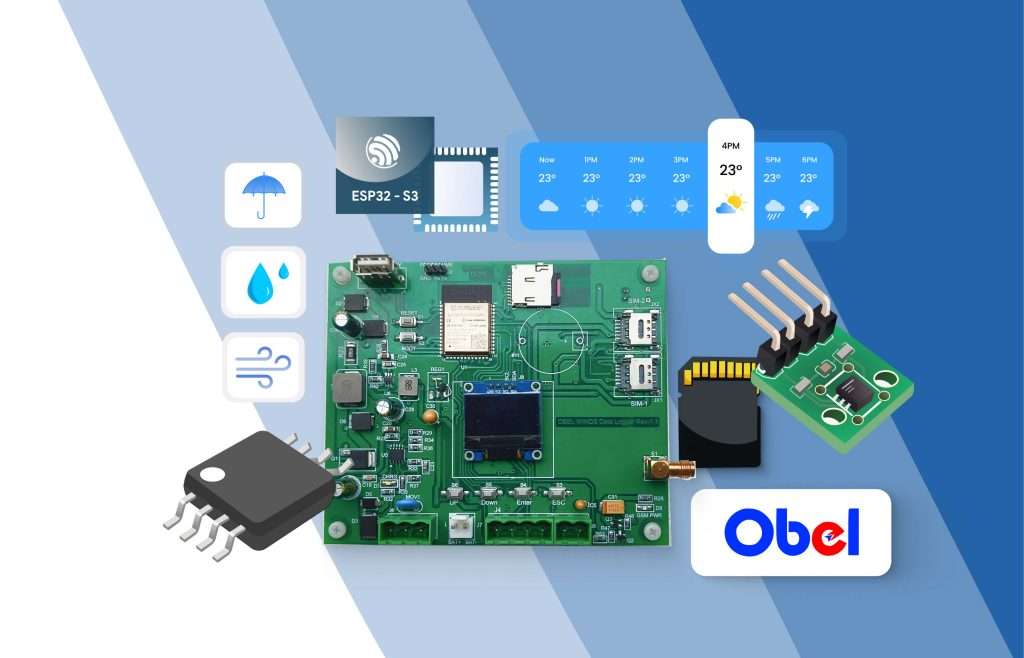Sensor DAQ - Rainfall sensor
Sensor/ DAQ
Rainfall sensor
Track rainfall with precision using low-power sensors designed for seamless integration into IoT systems.
What is a Rainfall Sensor?
A rainfall sensor accurately measures precipitation levels in real time. In IoT applications, rainfall sensors play a crucial role in environmental monitoring, water resource management and smart infrastructure. Our solution, which also has rainfall sensors, provides actionable data to help industries optimize operations, enhance safety and make informed decisions based on weather conditions.
Applications:
Agriculture
Optimize irrigation schedules and protect crops by monitoring rainfall patterns to improve water management and yield.
Water Management
Track precipitation levels to manage reservoirs, prevent flooding, and ensure effective water distribution.
Smart Cities
Enhance infrastructure resilience by monitoring rain patterns to prevent road flooding, sewer overflows, and waterlogging.
Construction Sites
Improve site safety and scheduling by tracking rainfall to avoid delays or unsafe working conditions.
Weather Forecasting
Enhance the accuracy of local weather predictions with real-time rainfall data.
Transportation and Logistics
Ensure safety and optimize routes by adjusting operations based on current and forecasted rain conditions.
Our solutions empower businesses to mitigate risks, improve efficiency, and enhance decision-making in weather-dependent operations.
How Data Acquisition Happens
Our rainfall sensors collect data through tipping bucket or optical detection methods to measure the volume and intensity of rainfall. Each tip of the bucket or change in optical signal is registered as a unit of rainfall, which is then processed by an embedded microcontroller.
This data is transmitted wirelessly via IoT communication protocols such as LoRaWAN, Wi-Fi, or Bluetooth to a secure cloud platform or edge device. The data is analyzed and visualized in real-time dashboards, allowing users to access precipitation data, generate reports, and receive automated alerts when critical thresholds are reached.
Peripheral Integration
Our rainfall sensors are designed for seamless integration with other IoT devices and platforms to deliver comprehensive environmental insights. They can work alongside:
Soil Moisture Sensors to create intelligent irrigation systems.
Wind Sensors for holistic weather monitoring.
Edge Processing Units for real-time analysis and automated responses.
Cloud-Based Platforms for data storage, visualization, and analytics.
SCADA Systems for automated control and monitoring in infrastructure and water management.
Standard communication protocols and APIs ensure interoperability with existing systems, enabling you to build a cohesive and scalable IoT ecosystem.
Features
High Precision
Accurate measurement of rainfall volume and intensity.
Real-Time Data Transmission
Immediate delivery of precipitation data for timely decision-making.
Wireless Connectivity
Supports LoRaWAN, Wi-Fi, and Bluetooth for flexible deployment.
Rugged Design
Built to withstand harsh weather conditions, including heavy rain, heat, and cold.
Low Power Consumption
Designed for long-term operation with minimal energy use.
Easy Maintenance
Self-cleaning mechanisms to ensure reliable performance with minimal upkeep.
Fast Sampling Rates
High-frequency data collection for detailed analysis of rainfall patterns.
Secure Data Transmission
End-to-end encryption ensures data integrity and security.
Usecases
Rainfall Sensor in Obel DLX5C
We utilized the Rain Pulse Sensor in the Obel DLX5C device to achieve precise rainfall measurement in real-time. This sensor helps the Indian Government’s Hydrology and Meteorology Departments monitor precipitation levels accurately. Integrated with advanced data logging and GSM modules, the sensor ensures reliable data transmission to remote servers, supporting weather analysis and timely alert generation during critical rainfall events.
